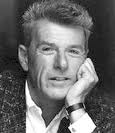The page of Gunn, Thom, English biography
Biography
Thom Gunn was born in Gravesend, Kent, England, in 1929, the older son of two journalists. His parents were divorced when the poet was ten years old, and his mother committed suicide while he was a teenager. Before her death, his mother had inspired a deep love of reading in him, including affection for the writings of Marlowe, Keats, Milton, and Tennyson, as well as several prose writers.
Before enrolling in Trinity College, Cambridge, in 1950, he spent two years in the national service and six months in Paris. In 1954, the year after his graduation, Gunn's first poetry collection, Fighting Terms, was published. The book was instantly embraced by several critics, including John Press, who wrote, "This is one of the few volumes of postwar verse that all serious readers of poetry need to possess and to study." Gunn relocated to San Francisco and held a one-year fellowship at Stanford University, where he studied with Yvor Winters.
Over the next few decades, he published several collections that were not as warmly received as his earliest work, including The Sense of Movement (1957), My Sad Captains (1961), Touch (1967), Moly (1971), To the Air (1974), Jack Straw's Castle (1976), Selected Poems 1950-1975 (1979), and The Passages of Joy (1983).
During the 1970s and 80s, Gunn's poems were marked by the poet's personal experiences as he wrote more openly about his homosexuality and drug use. Many critics believed he was betraying his talents. But with the publication of The Man with Night Sweats in 1992, a collection memorializing his friends and loved ones who had fallen victim of the AIDS pandemic, critics were reminded of Gunn's early promise. As Neil Powell wrote of the book, "Gunn restores poetry to a centrality it has often seemed close to losing, by dealing in the context of a specific human catastrophe with the great themes of life and death, coherently, intelligently, memorably. One could hardly ask for more." Gunn received the Lenore Marshall Poetry Prize for the collection in 1993.
He went on to publish several more books of poetry in the United States and Britain, including Boss Cupid (Farrar, Straus & Giroux, 2000), Frontiers of Gossip (1998), and Collected Poems (1994). He has also written several collections of essays, including The Occasions of Poetry (1982; U.S. edition, 1999).
Gunn's honors include the Levinson Prize, an Arts Council of Great Britain Award, a Rockefeller Award, the W. H. Smith Award, the PEN (Los Angeles) Prize for Poetry, the Sara Teasdale Prize, a Lila Wallace-Reader's Digest Award, the Forward Prize, and fellowships from the Guggenheim and MacArthur foundations.
Thom Gunn died on April 25, 2004, in his home in San Francisco.
(Editor of this page: P. T.)



